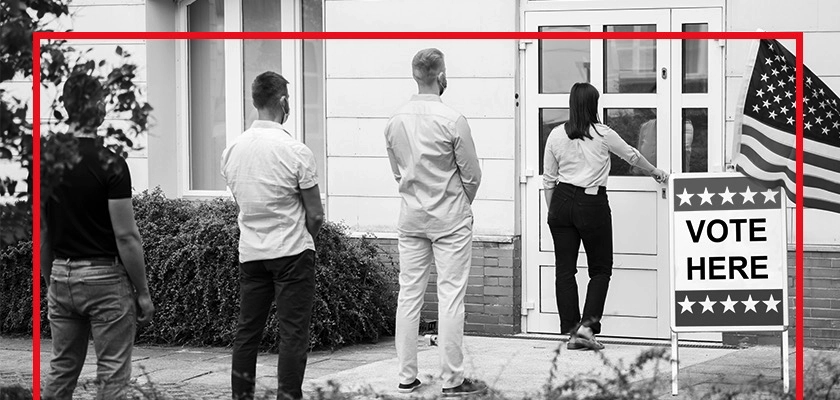"Civil Rights, Race, and Presidential Elections" - Greg Lukasik, Ph.D. | April 2021
While the 2020 Presidential Election had the highest voter turnout in 120 years, we also saw new initiatives to increase voter suppression.
Florida Atlantic University

In March 2021 Georgia Republican legislators proposed and passed a voting reform bill. Stacy Abrams, a prominent Black politician, and voting rights activist declared that attempts to restrict mail-in voting in Georgia were a “redux of Jim Crow in a suit and tie.”1 The Jim Crow reference is a powerful reminder of the legal segregation of schools, transportation, and housing in the South prior to the 1960s. What Abrams and others suggested is that the Republican Party in Georgia—and other states—are trying to suppress the black vote to win elections. Historical patterns of voting suggest that Black votes are the key to Democratic victories. In the 2020 presidential election, while a slight majority (54%) of white voters cast their votes for the incumbent president, Donald Trump, the overwhelming majority of Black voters (87%) voted to elect Democrat Joe Biden.2
The trend evident in the 2020 election has been stable for decades. The majority of whites have voted for Republican presidential candidates since 1968, and the majority of Black voters have voted for Democratic candidates since 1936. Between 1968 and 2004, no Republican presidential candidate has gotten more than 15% of the black vote.3 Reasons for this pattern include the history of the Civil Rights Movement, political ideology, and legislative priorities.
During the 1950s and 1960s, Black people across this country—particularly in the southern states—fought for freedom and equality. They marched, demonstrated, and took part in boycotts. They were beaten and jailed, and their leaders were assassinated. In response, Democratic presidents John F. Kennedy and Lyndon Johnson emerged as champions of Civil Rights. Kennedy made a passionate speech to the nation in support of racial equality in 1963. Johnson presided over major Civil Rights legislation, the Civil Rights Act of 1964, and the Voting Rights Act of 1965.
Many whites saw Johnson’s support for the Civil Rights Movement as a betrayal. After Johnson signed the Civil Rights Act of 1964, many southern democrats who supported racial segregation, the so-called Dixiecrats, defected from the Democratic Party. Johnson acknowledged this to his assistant, stating: “I think we just delivered the South to the Republican Party for a long time to come.”4 He was right.
The influx of white Southern Democrats who supported racial segregation caused a political realignment of the Republican Party. Republicans used Johnson’s expansive government programs, known as the War on Poverty, and the social unrest following Dr. King’s assassination to attract more whites to the party. Republican candidate Richard Nixon implied a connection between civil unrest and the Democrat-led welfare state. In his speech accepting the Republican nomination for president, Nixon declared: “For the past five years, we have been deluged by government programs for the unemployed; programs for the cities; programs for the poor. And we have reaped from these programs an ugly harvest of frustration, violence, and failure across the land.”5 To end the violence, he pledged to give voice to the “quiet,” “forgotten” majority of Americans. Although Nixon did not mention race directly, it was clear to many whites that he associated the Civil Rights struggle of the late 1960s with violence that threatened their interests.
Since then, race has played a role in the politics of both parties. The Republican Party advances conservative ideology that protects the status quo. Part of this status quo is that whites as a group maintain the benefits of institutional or systemic racism: the racism that is embedded as normal practices within society. This, combined with the “politics of fear” that creates and perpetuates many whites’ perceived fear of dropping down on the social ladder due to affirmative action or other (Democrat-supported) government programs, keeps many whites loyal to the Republican Party because it opposes such programs. Republican politicians’ hostility toward Civil Rights legislation—and, more recently, to the BLM Movement—keeps the majority of Blacks voters loyal to the Democratic Party, even when it fails to take meaningful action to close the social and economic gap between Black and white Americans.
Questions for Discussion
- If someday you decided to run for political office, what type of economic and/or social policies would you propose to appeal to all racial demographics?
- How does the knowledge of racial/ethnic inequality and discrimination in the U.S. shape your vote?
- Does the BLM Movement play a role in shaping voter's attitudes toward the two major parties today the way the Civil Rights Movement did in the 1960s? Why or why not?
- While on average women are more likely to vote Democratic, in the 2020 presidential election the majority of white women voted for Trump while the majority of black women voted for Biden. Does it mean that race is a stronger predictor of voting behavior than gender?
References
- First Thing: Stacey Abrams slams 'Jim Crow' voting reforms in Georgia (2021, March 15). The Guardian. https://www.theguardian.com/us-news/2021/mar/15/first-thing-stacey-abrams-slams-jim-crow-voting-reforms-in-georgia
- Duffin, Erin. (2020, ). Exit polls of the 2020 Presidential Election in the United States on November 3, 2020, share of votes by ethnicity. https://www.statista.com/statistics/1184425/presidential-election-exit-polls-share-votes-ethnicity-us/
- Jackson, Brooks. (2008, April 18). Blacks and the Democratic Party. https://www.factcheck.org/2008/04/blacks-and-the-democratic-party/
- Little, Becky. (2017, August 18). How the ‘Party of Lincoln’ Won Over the Once Democratic South. https://www.history.com/news/how-the-party-of-lincoln-won-over-the-once-democratic-south
- Richard M. Nixon Presidential Nomination Acceptance Speech. Republican National Convention, Miami Beach, Florida. August 8, 1968. http://www.4president.org/speeches/nixon1968acceptance.htm



